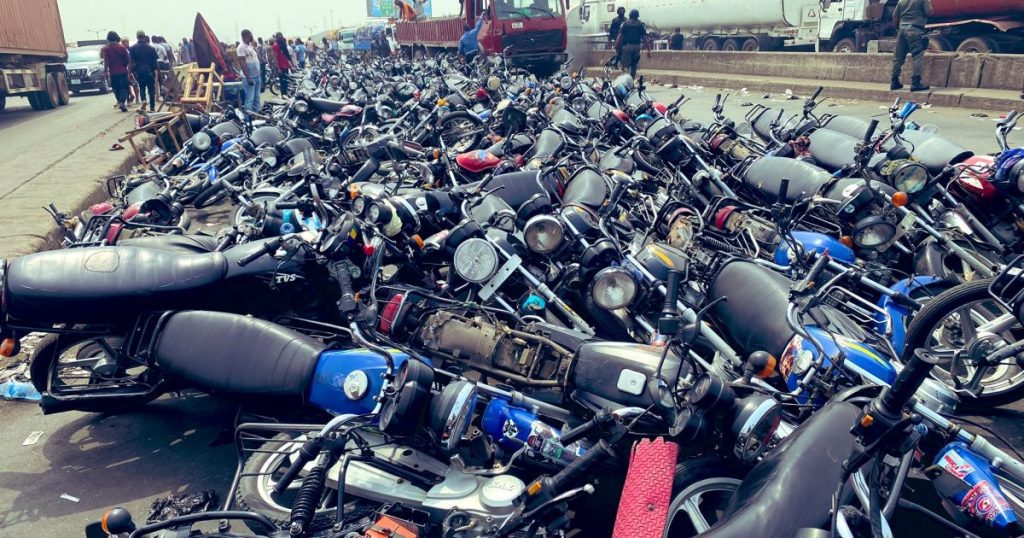In a surprise operation on the Oshodi-Apapa Expressway, the Lagos State Task Force impounded no fewer than 82 commercial motorcycles, popularly known as Okada, as part of efforts to enforce the state government’s ban on their operations in restricted areas. The raid, which took place around noon yesterday, targeted Mile 2, Second Rainbow, and Toyota bus stops, but turned chaotic as some riders attempted to flee, leading to a tense standoff between the motorcyclists and task force operatives.
Chaos and Resistance During the Operation
Eyewitnesses described the scene as pandemonium, with commercial motorcyclists throwing stones and sticks at task force operatives in a bid to escape arrest. Many riders abandoned their motorcycles and fled, while others engaged in physical struggles with the armed operatives.
“It was like a war zone,” said Tunde Omoyemi, an eyewitness. “I saw Okada riders from one end throwing stones and sticks at the task force operatives who were trying to arrest them. It was a very scary scene. Despite the chaos, the task force operatives managed to seize dozens of motorbikes and arrest many riders. Some of them sustained injuries in the ensuing stampede.”
The operation involved over 15 task force vehicles stationed along the expressway, with plans to extend the crackdown to other parts of the state. However, the effectiveness of the raid was called into question when some of the motorcyclists who escaped returned to work shortly after the operatives left.
Defiant Riders Resume Operations
In a surprising turn of events, commercial motorcyclists resumed their operations at Mile 2 and Second Rainbow almost immediately after the task force departed. The riders, seemingly unfazed by the earlier crackdown, continued to transport passengers as if nothing had happened.
A commuter at the Cele bus stop, Jude, expressed surprise at the boldness of the riders. “The brazen return of the Okada riders has raised questions about the effectiveness of the task force operation and the government’s ban on commercial motorcycling in the area,” he said.
Jude added, “While the operation may have resulted in the arrest of some riders and the seizure of their bikes, it appears to have had little lasting impact on the activities of the motorcyclists. It is a cat-and-mouse game between the Task Force and the Okada riders. Until the government finds a more permanent solution, this cycle of arrest and return will continue.”
Task Force Confirms Operation, Promises More Details
Gbadeyan Abdulraheem, Public Relations Officer of the Lagos State Task Force, confirmed the operation but stated that further details would be provided today. The raid is part of the state government’s ongoing efforts to enforce the ban on commercial motorcycles in restricted areas, including major highways and bridges, due to safety concerns and frequent accidents involving Okadas.
Challenges in Enforcing the Ban
The Lagos State government has faced significant challenges in enforcing the Okada ban, particularly in areas like Mile 2, where commercial motorcycling remains a primary mode of transportation for many residents. The high demand for Okada services, coupled with the lack of viable alternatives, has made it difficult to completely eradicate their operations.
Despite the government’s efforts, many riders continue to flout the ban, often returning to work shortly after raids. This has led to a cycle of crackdowns and defiance, raising questions about the sustainability of the current approach.
Calls for Permanent Solutions
Stakeholders have called for more comprehensive solutions to address the root causes of the Okada menace. Suggestions include providing affordable and efficient alternative transportation options, such as expanded bus routes and last-mile connectivity solutions, to reduce the reliance on commercial motorcycles.
Additionally, there have been calls for stricter enforcement of the ban, including harsher penalties for riders and passengers who violate the regulations. Some have also proposed the creation of designated zones where Okada operations are permitted, allowing for better regulation and monitoring.
Impact on Commuters and Residents
The Okada ban has had mixed reactions from Lagos residents. While many support the move due to safety concerns, others argue that the lack of viable alternatives has made life more difficult for commuters, particularly in areas with limited access to public transportation.
For residents of Mile 2 and surrounding communities, the return of Okada riders after the raid highlights the challenges of enforcing the ban in high-demand areas. Until the government provides sustainable alternatives, the cycle of raids and defiance is likely to continue.
Conclusion
The Lagos State Task Force’s raid on Mile 2 and other parts of the Oshodi-Apapa Expressway underscores the ongoing struggle to enforce the ban on commercial motorcycles in restricted areas. While the operation resulted in the impoundment of 82 Okadas and the arrest of several riders, the quick return of motorcyclists to the streets highlights the limitations of the current approach.
To achieve lasting results, the Lagos State government must address the underlying issues driving the demand for Okada services, including the lack of affordable and efficient transportation alternatives. Only through a combination of enforcement, regulation, and infrastructure development can the state effectively tackle the Okada menace and ensure the safety of its residents.
As the Task Force prepares to provide further details on the operation, stakeholders and residents alike await concrete steps toward a more permanent solution to the challenges posed by commercial motorcycling in Lagos.













